过去进行时与一般过去时比较语法及练习
- 格式:docx
- 大小:26.15 KB
- 文档页数:3
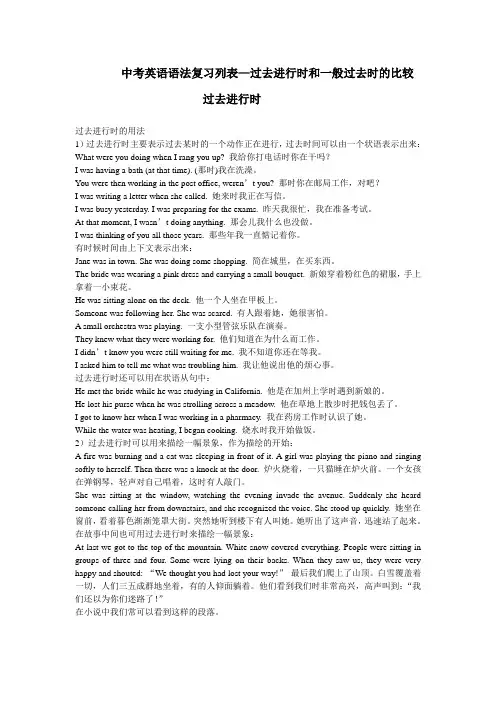
中考英语语法复习列表—过去进行时和一般过去时的比较过去进行时过去进行时的用法1)过去进行时主要表示过去某时的一个动作正在进行,过去时间可以由一个状语表示出来:What were you doing when I rang you up? 我给你打电话时你在干吗?I was having a bath (at that time). (那时)我在洗澡。
You were then working in the post office, weren’t you? 那时你在邮局工作,对吧?I was writing a letter when she called. 她来时我正在写信。
I was busy yesterday. I was preparing for the exams. 昨天我很忙,我在准备考试。
At that moment, I wasn’t doing anything. 那会儿我什么也没做。
I was thinking of you all those years. 那些年我一直惦记着你。
有时候时间由上下文表示出来:Jane was in town. She was doing some shopping. 简在城里,在买东西。
The bride was wearing a pink dress and carrying a small bouquet. 新娘穿着粉红色的裙服,手上拿着一小束花。
He was sitting alone on the deck. 他一个人坐在甲板上。
Someone was following her. She was scared. 有人跟着她,她很害怕。
A small orchestra was playing. 一支小型管弦乐队在演奏。
They knew what they were working for. 他们知道在为什么而工作。
I didn’t know you were still waiting for me. 我不知道你还在等我。

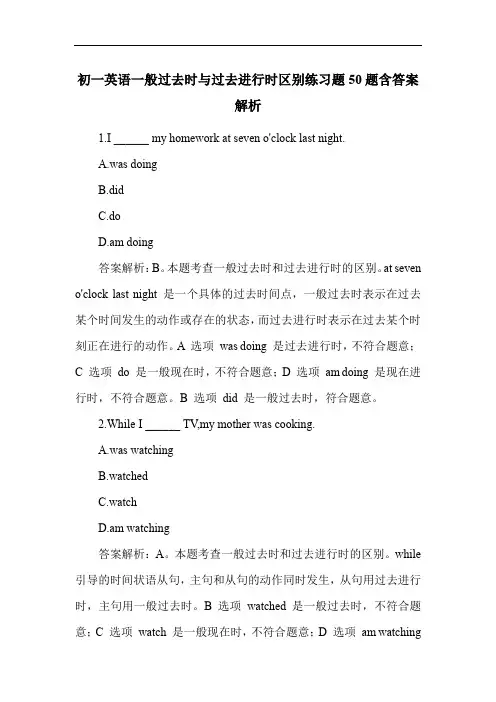
初一英语一般过去时与过去进行时区别练习题50题含答案解析1.I ______ my homework at seven o'clock last night.A.was doingB.didC.doD.am doing答案解析:B。
本题考查一般过去时和过去进行时的区别。
at seven o'clock last night 是一个具体的过去时间点,一般过去时表示在过去某个时间发生的动作或存在的状态,而过去进行时表示在过去某个时刻正在进行的动作。
A 选项was doing 是过去进行时,不符合题意;C 选项do 是一般现在时,不符合题意;D 选项am doing 是现在进行时,不符合题意。
B 选项did 是一般过去时,符合题意。
2.While I ______ TV,my mother was cooking.A.was watchingB.watchedC.watchD.am watching答案解析:A。
本题考查一般过去时和过去进行时的区别。
while 引导的时间状语从句,主句和从句的动作同时发生,从句用过去进行时,主句用一般过去时。
B 选项watched 是一般过去时,不符合题意;C 选项watch 是一般现在时,不符合题意;D 选项am watching是现在进行时,不符合题意。
A 选项was watching 是过去进行时,符合题意。
3.I ______ to music when my friend came in.A.listenedB.was listeningC.listenD.am listening答案解析:B。
本题考查一般过去时和过去进行时的区别。
when 引导的时间状语从句,从句用一般过去时,主句用过去进行时。
A 选项listened 是一般过去时,不符合题意;C 选项listen 是一般现在时,不符合题意;D 选项am listening 是现在进行时,不符合题意。
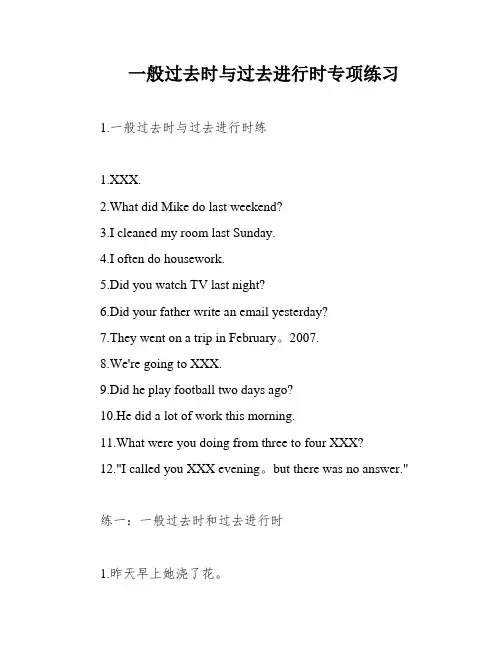
一般过去时与过去进行时专项练习1.一般过去时与过去进行时练1.XXX.2.What did Mike do last weekend?3.I cleaned my room last Sunday.4.I often do housework.5.Did you watch TV last night?6.Did your father write an email yesterday?7.They went on a trip in February。
2007.8.We're going to XXX.9.Did he play football two days ago?10.He did a lot of work this morning.11.What were you doing from three to four XXX?12."I called you XXX evening。
but there was no answer." 练一:一般过去时和过去进行时1.昨天早上她浇了花。
2.XXX上周末做了什么?3.上周日我打扫了我的房间。
4.我经常做家务。
5.昨晚你看电视了吗?6.你父亲昨天写了一封电子邮件吗?7.他们在2007年2月去旅行了。
8.我们明天要去爬山。
9.他两天前踢了足球吗?10.他今天早上做了很多工作。
11.昨天下午三点到四点你在做什么?12.“我昨晚打电话给你,但是没有回应。
”Oh。
I'm sorry I had XXX.XXX.When I got home。
XXX.XXX.She asked him whether he was XXX.Could you tell me when she is coming?XXX was drawing when I came into the classroom.The pizza was made by my mother。
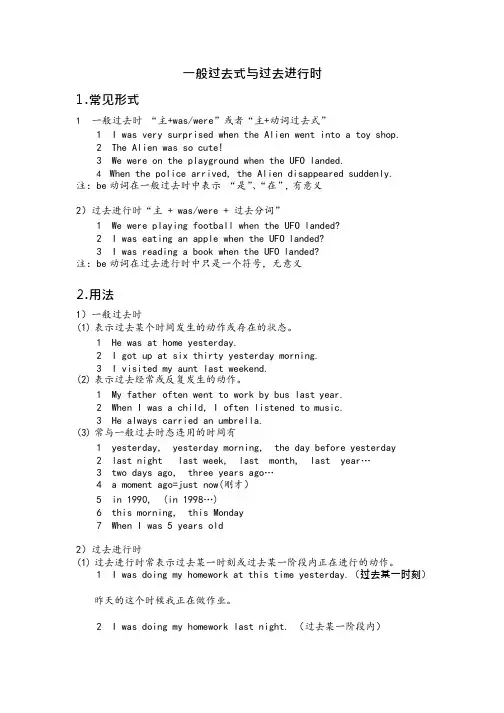
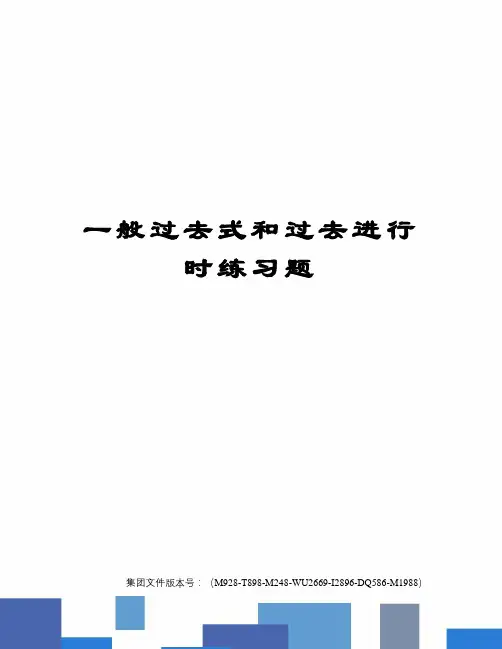
一般过去式和过去进行时练习题集团文件版本号:(M928-T898-M248-WU2669-I2896-DQ586-M1988)初中英语一般过去时知识讲解与训练1.一般过去时表示过去某个时间发生的动作或存在的状态,常和表示过去的时间状语连用。
一般过去时也表示过去经常或反复发生的动作。
2.Be动词在一般过去时中的变化:⑴am 和is在一般过去时中变为was。
(was not=wasn’t)⑵are在一般过去时中变为were。
(were not=weren’t)⑶带有was或were的句子,其否定、疑问的变化和is, am, are一样,即否定句在was或were后加not,一般疑问句把was或were放到句首。
3.句中没有be动词的一般过去时的句子否定句:didn’t +动词原形,如:Jim didn’t go home yesterday.一般疑问句:在句首加did,句子中的动词过去式变回原形。
如:Did Jim go home yesterday特殊疑问句:⑴疑问词+did+主语+动词原形?如: What did Jim do yesterday⑵疑问词当主语时:疑问词+动词过去式?如:Who went to home yesterday动词过去式变化规则:1.一般在动词末尾加-ed,如:pull-pulled, cook-cooked2.结尾是e加d,如:taste-tasted3.末尾只有一个元音字母和一个辅音字母的重读闭音节,应双写末尾的辅音字母,再加-ed,如:stop-stopped4.以“辅音字母+y”结尾的,变y为i,再加-ed,如:study-studied5.不规则动词过去式:参考课本最后时间状语Ago(一段时间+ago),yesterday(句子开头或结尾),the day before yesterday,last week,last(year,night,month…),具体时间(如Jan.fourth),just(刚刚) now,this morning.long long ago (很久以前)。
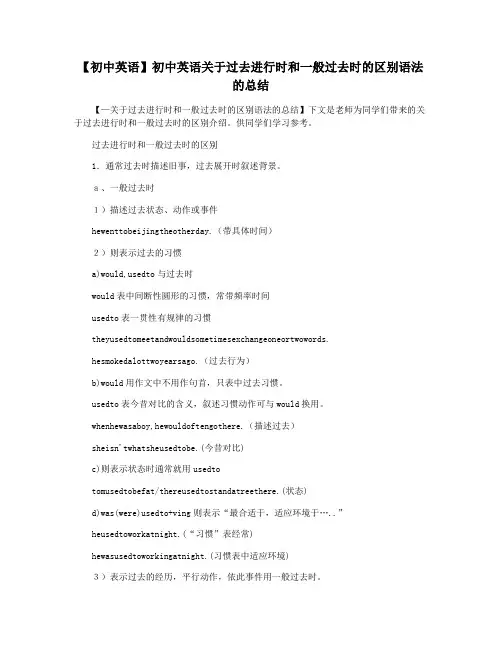
【初中英语】初中英语关于过去进行时和一般过去时的区别语法的总结【—关于过去进行时和一般过去时的区别语法的总结】下文是老师为同学们带来的关于过去进行时和一般过去时的区别介绍。
供同学们学习参考。
过去进行时和一般过去时的区别1.通常过去时描述旧事,过去展开时叙述背景。
a、一般过去时1)描述过去状态、动作或事件hewenttobeijingtheotherday.(带具体时间)2)则表示过去的习惯a)would,usedto与过去时would表中间断性圆形的习惯,常带频率时间usedto表一贯性有规律的习惯theyusedtomeetandwouldsometimesexchangeoneortwowords.hesmokedalottwoyearsago.(过去行为)b)would用作文中不用作句首,只表中过去习惯。
usedto表今昔对比的含义,叙述习惯动作可与would换用。
whenhewasaboy,hewouldoftengothere.(描述过去)sheisn'twhatsheusedtobe.(今昔对比)c)则表示状态时通常就用usedtotomusedtobefat/thereusedtostandatreethere.(状态)d)was(were)usedto+ving则表示“最合适于,适应环境于…..”heusedtoworkatnight.(“习惯”表经常)hewasusedtoworkingatnight.(习惯表中适应环境)3)表示过去的经历,平行动作,依此事件用一般过去时。
hesatthereandlistenedtotheradio.(依此出现)4)表示客气委婉的语气,用于情态动词,助动词和want,wonder,hope等 howdidyoulikethefilm?/couldyouhelpme?b.过去进行时-则表示在过去某阶段或某一时刻正在出现whatwereyoudoingat8:30lastnight?(过去某时刻正在发生)-短暂性动词用过去展开时则表示按计划、急于duringthattimehewasgoingwithus.(表示打算)-与always,often,usually等属格表中钟爱,喜欢等感情色彩。
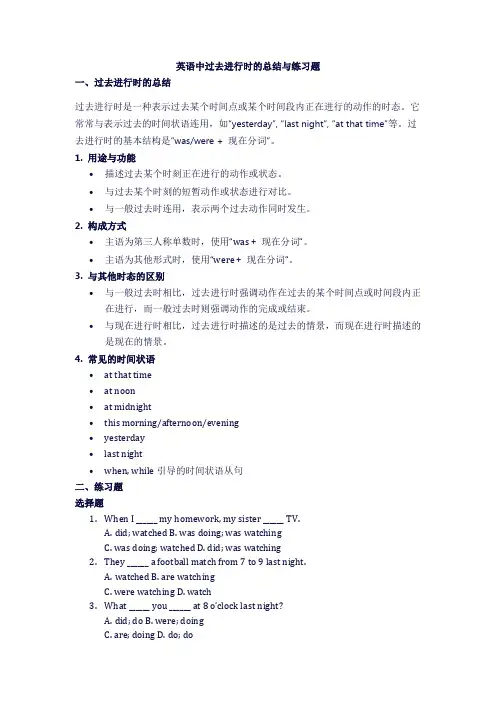
英语中过去进行时的总结与练习题一、过去进行时的总结过去进行时是一种表示过去某个时间点或某个时间段内正在进行的动作的时态。
它常常与表示过去的时间状语连用,如“yesterday”, “last night”, “at that time”等。
过去进行时的基本结构是“was/were + 现在分词”。
1. 用途与功能•描述过去某个时刻正在进行的动作或状态。
•与过去某个时刻的短暂动作或状态进行对比。
•与一般过去时连用,表示两个过去动作同时发生。
2. 构成方式•主语为第三人称单数时,使用“was + 现在分词”。
•主语为其他形式时,使用“were + 现在分词”。
3. 与其他时态的区别•与一般过去时相比,过去进行时强调动作在过去的某个时间点或时间段内正在进行,而一般过去时则强调动作的完成或结束。
•与现在进行时相比,过去进行时描述的是过去的情景,而现在进行时描述的是现在的情景。
4. 常见的时间状语•at that time•at noon•at midnight•this morning/afternoon/evening•yesterday•last night•when, while引导的时间状语从句二、练习题选择题1.When I ______ my homework, my sister ______ TV.A. did; watchedB. was doing; was watchingC. was doing; watchedD. did; was watching2.They ______ a football match from 7 to 9 last night.A. watchedB. are watchingC. were watchingD. watch3.What ______ you ______ at 8 o’clock last night?A. did; doB. were; doingC. are; doingD. do; do4.It was raining hard. They ______ just ______ their umbrellas.A. had; leftB. have; leftC. had; been leavingD. were; leaving5.We ______ a film at 8 last night when the power cut off.A. watchedB. are watchingC. were watchingD. had watched填空题1.I ______ (cook) dinner when the phone rang.st night, they ______ (play) cards when I ______ (arrive) home.3.While the teacher ______ (explain) the text, the students ______ (take) notes.4.We ______ (have) a meeting from 2 to 4 yesterday afternoon.5.When I ______ (get) to the station, the train ______ (leave).翻译题1.昨天晚上8点,我正在做作业,而我的弟弟正在看电视。
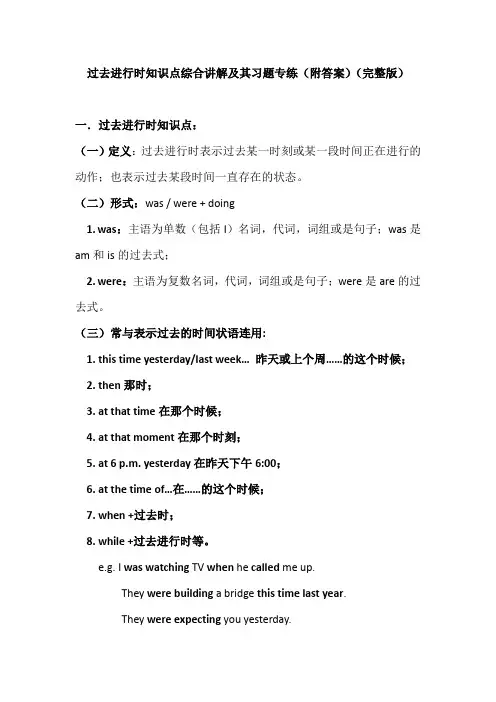
过去进行时知识点综合讲解及其习题专练(附答案)(完整版)一.过去进行时知识点:(一)定义:过去进行时表示过去某一时刻或某一段时间正在进行的动作;也表示过去某段时间一直存在的状态。
(二)形式:was / were + doing1. was:主语为单数(包括I)名词,代词,词组或是句子;was是am和is的过去式;2. were:主语为复数名词,代词,词组或是句子;were是are的过去式。
(三)常与表示过去的时间状语连用:1. this time yesterday/last week… 昨天或上个周……的这个时候;2. then那时;3. at that time在那个时候;4. at that moment在那个时刻;5. at 6 p.m. yesterday在昨天下午6:00;6. at the time of…在……的这个时候;7. when +过去时;8. while +过去进行时等。
e.g. I was watching TV when he called me up.They were building a bridge this time last year.They were expecting you yesterday.He was reading when the rainstorm came.While Mary was sleeping, Tom was doing his homework.(四)过去进行时中肯定句,否定句和一般疑问句的转换规则及一般疑问句的肯定及否定回答的知识点汇总。
含有be动词(was/were)的陈述句转换为一般疑问句时,直接把be动词提到句首,然后把“.”转换为“?”即可,其中第一人称I 和we要相应的转换为第二人称you。
肯定及否定回答用相对应的be 动词来回答即可,但是主语需转换为对应的人称代词(there be句型除外,直接用there来回答);若是肯定句转换为否定句,直接在be 动词后面加not,可缩写,可全称;但否定回答只能用缩写。
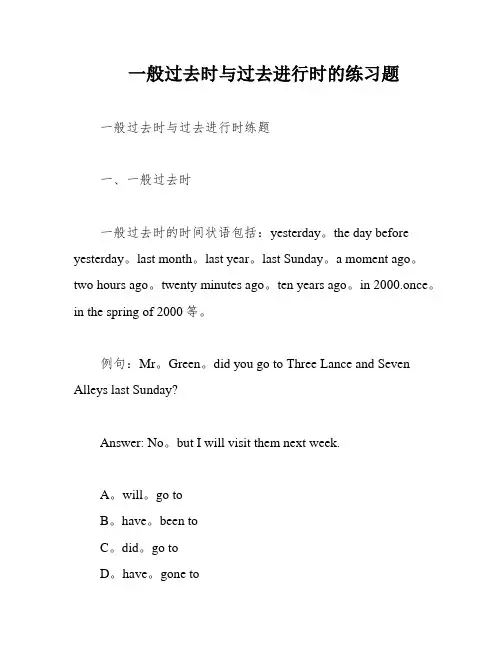
一般过去时与过去进行时的练习题一般过去时与过去进行时练题一、一般过去时一般过去时的时间状语包括:yesterday。
the day before yesterday。
last month。
last year。
last Sunday。
a moment ago。
two hours ago。
twenty minutes ago。
ten years ago。
in 2000.once。
in the spring of 2000等。
例句:Mr。
Green。
did you go to Three Lance and Seven Alleys last Sunday?Answer: No。
but I will visit them next week.A。
will。
go toB。
have。
been toC。
did。
go toD。
have。
gone to答案为A。
二、一般过去时的句型肯定句的结构为:主语+动词的过去式+其它。
例句:He went to the toy store ___.否定句的结构为:主语+did not(didn’t)+动词原形+其它。
例句:___’t go to the toy store ___.一般过去时的一般疑问句的构成为:Did+主语+动词原形+其它?例句1:Did you go to Beijing last week?Answer: Yes。
we did。
(No。
we ___’t.)例句2:Did you meet the businessman before?Answer: No。
I didn’t。
(Yes。
I did.)一般过去时的特殊疑问句的构成为:疑问词+did+主语+动词原形+其它?例句1:What did you do last night?Answer: ___.例句2:Where did you go last week?Answer: I went to Shanghai with my parents.三、规则规则动词的过去分词的构成规则与规则动词的过去式的构成规则相同。
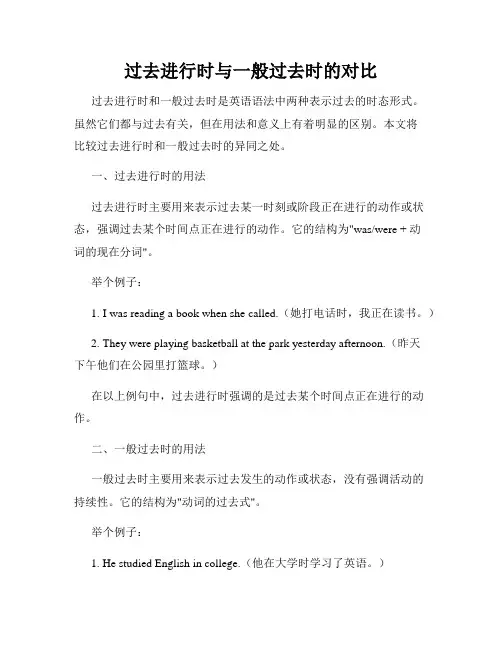
过去进行时与一般过去时的对比过去进行时和一般过去时是英语语法中两种表示过去的时态形式。
虽然它们都与过去有关,但在用法和意义上有着明显的区别。
本文将比较过去进行时和一般过去时的异同之处。
一、过去进行时的用法过去进行时主要用来表示过去某一时刻或阶段正在进行的动作或状态,强调过去某个时间点正在进行的动作。
它的结构为"was/were + 动词的现在分词"。
举个例子:1. I was reading a book when she called.(她打电话时,我正在读书。
)2. They were playing basketball at the park yesterday afternoon.(昨天下午他们在公园里打篮球。
)在以上例句中,过去进行时强调的是过去某个时间点正在进行的动作。
二、一般过去时的用法一般过去时主要用来表示过去发生的动作或状态,没有强调活动的持续性。
它的结构为"动词的过去式"。
举个例子:1. He studied English in college.(他在大学时学习了英语。
)2. She visited her grandparents last weekend.(她上周末去拜访了她的祖父母。
)在以上例句中,一般过去时表示的是过去已经发生的动作或状态,没有强调动作持续的时间。
三、过去进行时与一般过去时的区别1. 强调不同:过去进行时强调过去某个时间点正在进行的动作,而一般过去时则强调过去已经发生的动作。
2. 持续性不同:过去进行时强调动作的持续性,表示动作正在进行中或在某个时间段内进行,而一般过去时没有强调动作的持续性,只表示动作已经完成。
3. 细节不同:过去进行时常用于描述过去某个时间点正在进行的动作,着重强调过去的具体细节;一般过去时则更常用于叙述过去的故事、经历或结论。
举个例子来对比说明:1. I was cooking dinner when the phone rang.(电话响的时候我正在做晚饭。
一般过去时与过去进行时练习题及答案过去时和过去进行时是英语中常见的两个过去时态,它们在描述过去发生的动作或情况时有着不同的用法和特点。
下面,我们将通过一些练习题来帮助巩固对一般过去时和过去进行时的掌握。
练习题:1. 填入适当的一般过去时形式。
a) They ______ (play) football yesterday.b) She ______ (go) to London last week.c) We ______ (watch) a movie at the cinema last night.d) He ______ (have) a great time at the party.e) I ______ (study) French when I was in high school.2. 根据句意,用适当的一般过去时或过去进行时填空。
a) When I arrived, they ______ (have) dinner.b) We ______ (play) tennis when it started to rain.c) He ______ (work) in that company for five years before he moved to another city.d) They ______ (watch) TV all day yesterday.e) I ______ (read) a book while she was cooking.3. 根据句意,选择适当的动词形式填空,可以用一般过去时或过去进行时。
a) She ______ (paint) a picture when I called her.b) They ______ (go) camping last summer.c) I ______ (not/see) him at the party. He ______ (stay) home because he was sick.d) What ______ you ______ (do) when you saw the accident?e) The children ______ (play) in the park when it suddenly started to rain.答案:1. 填入适当的一般过去时形式。
英语语法:过去进行时和一般过去时的区别3.过去进行时和一样过去时的区别过去进行时强调过去某时刻或者时期动作的进行,不说明动作的完成,而一样过去时表示过去某动作已发生,说明动作已完成。
比较例句:1)He was writing a composition last night. He’s going to finish it today.他昨天晚上在写一篇作文。
他打算今天完成。
2)He wrote a composition last night. He’s going to hand it in t oday.他昨天晚上写了一篇作文。
他打算今天交上去。
3)They were digging a well last winter. So far they haven’t fini shed it.他们去年冬天在挖井,至今还未完成。
4)They dug a well last winter.他们去年冬天挖了一口井。
5)They were having a meeting yesterday.他们昨天在开会。
6)They had a meeting yesterday.他们昨天开了一个会。
7)She was singing songs last night.她昨天晚上在唱歌。
8)She sang songs last night.她昨天晚上唱了几首歌。
一、选择填空。
1.——___ to see Mr. Mandy. My appointment is a 10 o’clock.——You are on time for your appointment.A.I’ve comeB. I’d comeC.I comeD. I came2.The head nurse has to walk around the wards, and makes sure that the nurses___ their jobs.A.would doB. had doneC.are doingD. were doing参考答案:1-2: AC二、分析句子的语法结构,并译成中文。
过去进行时过去进行时可以表示过去某一个时刻或者过去一段时间内正在进行的动作。
结构:was/were doing一、时间状态1.常常和表示过去的时间状语连用Then 那时,at the time在那时This time yesterday 昨天的这个时候At ten yesterday 昨天晚上十点2.用另一个表示过去的动作来确定时间状态比如:when you called me yesterday.例句:what are you doing ?I was watching TV at that time. 昨天晚上十点钟你在干嘛,那个时间我正在看电视。
He was reading when i came in .当我进来时,他在读书。
I was doing my homework while my parents were watching TV。
3.过去进行时常常和always 等表示频率的副词连用,表示过去频繁发生的习惯性动作。
有感情色彩。
例句:Lily was always changing her mind。
莉莉总在改变主意。
(不以为然)He was always ringing me up. 他老是给我打。
(厌烦)She was always working. 她总是不停地干活。
(赞扬)二、一般过去时和过去进行时的区别They played basketball yesterday.(一般过去时)They were playing basketball at 4:00PM yesterday.(过去进行时)强调动作在过去某个时间或某段时间正在进行时,不明确是否结束,用过去进行时。
一般过去时的时间点没有过去进行时的时间点明确。
例句:He ate all the cakes yesterday .他昨天吃完了蛋糕。
He was eating cakes at this time yesterday.昨天这个时候他正在吃蛋糕。
A: What did you do yesterday morning?B:We played tenn is(from 10 to11.30).开始结束10o' clock 11.30We played(动作完成)Jack read a book yesterday.(= from beg inning to end) Did you watch the film on television last night? It didn ' t rain hile we were on holiday? 匚A:What were you doing at 10.30 匚B:We werer playing tennis.开始10o' clock---------------------------- ►\\ t / /We were playing(动作未完成)Jack was reading a book yesterday.(= frombeg inning to end)Were you watching television when I phoneyou?(过去进行时)(一般过去I was doing过去进行时)与I did(—般过去时)比较AWhat happened? The phone rang(—般过去时)What was Jack doing when the phone rang? - iHe was readings book. | _What did he do whe n the pho ne rang?He stopped read ing and answered the pho ne. 杰克在电话铃响之前已开始看书,所以应说:When the phone ran g,he was reading. he started thephone he stoppedI started work at 9o' clock ar fihished at 4.30. At 2.30 I was workingIt was raining whe n we went out.(=it started rai ning before we went out)I saw Lucy and Steve this morni ng. They were waiting at the bus stop.he an swered(kick)the •…•ball ...... a ndKelley fell asleep while she was reading.Exercises14.1用动词的过去进行时或一般过去时形式填空.1.A: What were . you . doing (you/do)whe n the pho ne.rang (rin g). B:l was watchi ng (watch)televisi on.2 A: Was Jane busy whe n you went to see her? B: Yes,she .......................................................... .(study).3 A: What time ..................................................................................... (the post/a?rive)this mornin B: It ........................................................ ..(come)while I ................................................ (have)bre4 A: Was Tracey at work today?B:No,she .............................................. ..(not/go)to wak.She5 A:How fast ............................................................................................. .. .......... the … (you/drive)v police ....................................... .(stop)you?B:I ' m not sure,but I ........................................................................ ..(not/drive) very fast. 6 A: ................................................................ (your team/win)the football match yesterday? B: The weather was very bad,so we........................................... ..(no t/play).7 A:How ...................................... ..(you/break)the window? B:We ......................................... .(play)football.I it .................................... .(hit)the window.8A: ................................................. ..(you/see)Je nny last n ight?B:Yes,she ............................................. (wear)a very nice jacket.9A: What ....................................................... ..(you/do)at 2 o ' clock this morning? B: I was asleep.。
一般过去时、过去进行时和过去完成时语法专题突破品味语法1.I got up early,washed my face,had a quick breakfast and hurried to school.2.He was watching TV at home from 3∶00 to 5∶00 yesterday afternoon.3.He had just finished sweeping the classroom when the teacher returned from the office自我探究这三句都使用了过去的时态。
第1句是一般过去时,表示“发生在过去的”动作;第2句是过去进行时,表示“在过去某一时刻或某段时间正在发生的动作”;第3句是过去完成时,表示在“过去某一时间之前已经完成的动作”。
讲解归纳一、一般过去时1.表示在确定的过去时间内发生的动作或状态。
Did you watch the football match broadcast on TV yesterday evening?你昨晚观看电视转播的足球赛了吗?2.表示过去经常发生的动作或习惯性动作。
I always got up too late,and never had enough time for breakfast.我总是起床很晚,从来没有足够的时间吃早饭。
【温馨提示】这种情况也可用used to 和would 表示。
3.描述几个相继发生的过去动作。
The students got up early in the morning,did morning exercises and then read English aloudin the open air.学生们起床很早,做早操,然后在室外朗读英语。
4.有时动词的一般过去时形式上为过去,而实际上却指现在,即“原来想的”与现在的实际情况不相符。
I thought you were out.我原以为你出去了。
I was doing(过去进行时)与I did(一般过去时)比较A
What happened? The phone rang.(一般过去时)
What was Jack doing when the phone rang?
He was reading a book.
(过去进行时
)
What did he do when the phone rang?
He
stopped reading and answered the phone. (一般过去进)
杰克在电话铃响之前已开始看书,所以应说:
When the phone rang,he was reading.
he started
the phone he stopped he answered
一般过去时过去进行时
☐A: What did you do yesterday morning? A:What were you doing at 10.30 B:We played tennis(from 10 to11.30). B:We werer playing tennis.
开始结束开始
10o’clock
☐I started work at 9o’clock and finished at 4.30. At 2.30 I was working. ☐It was raining when we went out.(=it started raining before we went out) ☐I saw Lucy and Steve this morning. They were waiting at the bus stop.
☐Kelley fell asleep while she was reading.
Exercises
14.1 用动词的过去进行时或一般过去时形式填空.
1.A: What were you doing (you/do)when the phone rang (ring).
B:I was watching (watch)television.
2 A: Was Jane busy when you went to see her?
B: Yes,she …………………………….(study).
3 A: What time………………………………………(the post/arrive)this morning? B: It…………………………..(come)while I………………………(have)breakfast.
4 A: Was Tracey at work today?
B:No,she…………………………..(not/go)to work.She was ill.
5 A:How fast……………………………………………..……………(you/drive)when the police………………….(stop)you?
B:I’m not sure,but I……………………………..(not/drive) very fast.
6 A:………………………………(your team/win)the football match yesterday? B: The weather was very bad,so we …………………………..(not/play).
7 A:How …………………..(you/break)the window?
B:We…………………….(play)football.I…………………….(kick)the ball and it………………….(hit)t he window.
8 A: …………………………..(you/see)Jenny last night?
B:Yes,she………………………(wear)a very nice jacket.
9 A: What…………………………..(you/do)at 2 o’clock this morning?
B: I was asleep.。